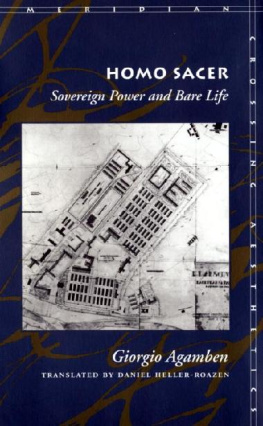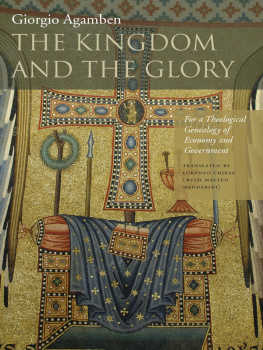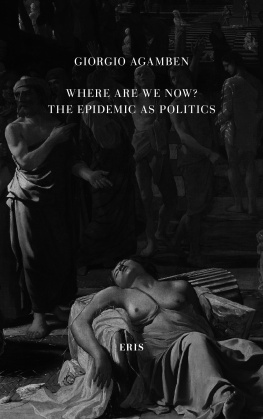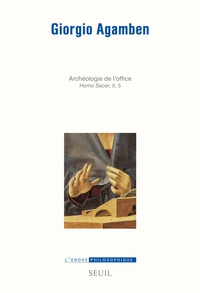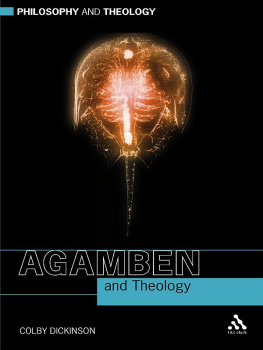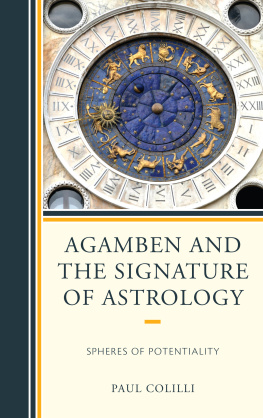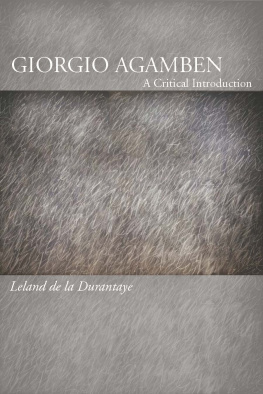Giorgio Agamben - Homo Sacer: Sovereign Power and Bare Life
Here you can read online Giorgio Agamben - Homo Sacer: Sovereign Power and Bare Life full text of the book (entire story) in english for free. Download pdf and epub, get meaning, cover and reviews about this ebook. year: 1998, publisher: Stanford University Press, genre: Science. Description of the work, (preface) as well as reviews are available. Best literature library LitArk.com created for fans of good reading and offers a wide selection of genres:
Romance novel
Science fiction
Adventure
Detective
Science
History
Home and family
Prose
Art
Politics
Computer
Non-fiction
Religion
Business
Children
Humor
Choose a favorite category and find really read worthwhile books. Enjoy immersion in the world of imagination, feel the emotions of the characters or learn something new for yourself, make an fascinating discovery.
- Book:Homo Sacer: Sovereign Power and Bare Life
- Author:
- Publisher:Stanford University Press
- Genre:
- Year:1998
- Rating:4 / 5
- Favourites:Add to favourites
- Your mark:
- 80
- 1
- 2
- 3
- 4
- 5
Homo Sacer: Sovereign Power and Bare Life: summary, description and annotation
We offer to read an annotation, description, summary or preface (depends on what the author of the book "Homo Sacer: Sovereign Power and Bare Life" wrote himself). If you haven't found the necessary information about the book — write in the comments, we will try to find it.
Homo Sacer: Sovereign Power and Bare Life — read online for free the complete book (whole text) full work
Below is the text of the book, divided by pages. System saving the place of the last page read, allows you to conveniently read the book "Homo Sacer: Sovereign Power and Bare Life" online for free, without having to search again every time where you left off. Put a bookmark, and you can go to the page where you finished reading at any time.
Font size:
Interval:
Bookmark:



Werner Hamacher & David E. Wellbery
Editors
Translated by
Daniel Heller-Roazen

and Bare Life
Giorgio Agamben
I
PART ONE: THE LOGIC OF SOVEREIGNTY
PART TWO: HOMO SACER
PART THREE: THE CAMP AS BIOPOLITICAL PARADIGM OF THE MODERN
Das Recht hat kein Dasein fiir sich, sein Wesen vielmehr ist das Leben der Menschen selbst, von einer Seite angesehen.
-Savigny
Law has no existence for itself; rather its essence lies, from a certain perspective, in the very life of men.
Ita in iure civitatis, civiumque officiis investigandis opus est, non quidem ut dissolvatur civitas, sed tamen ut tanquam dissoluta consideretur, id est, ut qualis sit natura humana, quibus rebus ad civitatem compaginandam apta vel inepta sit, et quomodo homines inter se componi debeant, qui coalescere volunt, recte intelligatur.
-Hobbes
To make a more curious search into the rights of States, and duties of Subjects, it is necessary, (I say not to take them in sunder, but yet that) they be so considered, as if they were dissolved, (i.e.) that wee rightly understand what the quality of humane nature is, in what matters it is, in what not fit to make up a civill government, and how men must be agreed among themselves, that intend to grow up into a well-grounded State.
Eurete moi he entole he eis zoen, aute eis thanaton.
-Saint Paul
And the commandment, which was ordained to life, I found to be unto death.

and Bare Life
The Greeks had no single term to express what we mean by the word "life." They used two terms that, although traceable to a common etymological root, are semantically and morphologically distinct: zoi, which expressed the simple fact of living common to all living beings (animals, men, or gods), and bios, which indicated the form or way of living proper to an individual or a group. When Plato mentions three kinds of life in the Philebus, and when Aristotle distinguishes the contemplative life of the philosopher (bios theoritikos) from the life of pleasure (bios apolaustikos) and the political life (bios politikos) in the Nichomachean Ethics, neither philosopher would ever have used the term zoi (which in Greek, significantly enough, lacks a plural). This follows from the simple fact that what was at issue for both thinkers was not at all simple natural life but rather a qualified life, a particular way of life. Concerning God, Aristotle can certainly speak of a zoe aristi kai aidios, a more noble and eternal life (Metaphysics, io72b, 28), but only insofar as he means to underline the significant truth that even God is a living being (similarly, Aristotle uses the term zoi in the same context-and in a way that is just as meaningful-to define the act of thinking). But to speak of a zoi politiki of the citizens of Athens would have made no sense. Not that the classical world had no familiarity with the idea that natural life, simple zoi as such, could be a good in itself. In a passage of the Politics, after noting that the end of the city is life according to the good, Aristotle expresses his awareness of that idea with the most perfect lucidity:
This [life according to the good] is the greatest end both in common for all men and for each man separately. But men also come together and maintain the political community in view of simple living, because there is probably some kind of good in the mere fact of living itself [kata to zen auto monon]. If there is no great difficulty as to the way of life [kata ton bion], clearly most men will tolerate much suffering and hold on to life [zoe] as if it were a kind of serenity [euemeria, beautiful day] and a natural sweetness. (iz78b, 23-30
In the classical world, however, simple natural life is excluded from the polls in the strict sense, and remains confined-as merely reproductive life-to the sphere of the oikos, "home" (Politics, 1252a, 26-35). At the beginning of the Politics, Aristotle takes the greatest care to distinguish the oikonomos (the head of an estate) and the despotes (the head of the family), both of whom are concerned with the reproduction and the subsistence of life, from the politician, and he scorns those who think the difference between the two is one of quantity and not of kind. And when Aristotle defined the end of the perfect community in a passage that was to become canonical for the political tradition of the West (i252b, 30), he did so precisely by opposing the simple fact of living (to zen) to politically qualified life (to eu zen): ginomene men oun tou zen heneken, ousa de tou eu zen, "born with regard to life, but existing essentially with regard to the good life" (in the Latin translation of William of Moerbeke, which both Aquinas and Marsilius of Padua had before them: facta quidem igitur vivendi gratia, existens autem gratia bene vivendi).
It is true that in a famous passage of the same work, Aristotle defines man as a politikon zoon (Politics, 1253a, 4). But here (aside from the fact that in Attic Greek the verb bionai is practically never used in the present tense), "political" is not an attribute of the living being as such, but rather a specific difference that determines the genus zoon. (Only a little later, after all, human politics is distinguished from that of other living beings in that it is founded, through a supplement of politicity [policitd] tied to language, on a community not simply of the pleasant and the painful but of the good and the evil and of the just and the unjust.)
Michel Foucault refers to this very definition when, at the end of the first volume of The History of Sexuality, he summarizes the process by which, at the threshold of the modern era, natural life begins to be included in the mechanisms and calculations of State power, and politics turns into biopolitics. "For millennia," he writes, "man remained what he was for Aristotle: a living animal with the additional capacity for political existence; modern man is an animal whose politics calls his existence as a living being into question" (La volonte, p. 188).
According to Foucault, a society's "threshold of biological modernity" is situated at the point at which the species and the individual as a simple living body become what is at stake in a society's political strategies. After 1977, the courses at the College de France start to focus on the passage from the "territorial State" to the "State of population" and on the resulting increase in importance of the nation's health and biological life as a problem of sovereign power, which is then gradually transformed into a "government of men" (Dits et ecrits, 3: 719). "What follows is a kind of bestialization of man achieved through the most sophisticated political techniques. For the first time in history, the possibilities of the social sciences are made known, and at once it becomes possible both to protect life and to authorize a holocaust." In particular, the development and triumph of capitalism would not have been possible, from this perspective, without the disciplinary control achieved by the new bio-power, which, through a series of appropriate technologies, so to speak created the "docile bodies" that it needed.
Font size:
Interval:
Bookmark:
Similar books «Homo Sacer: Sovereign Power and Bare Life»
Look at similar books to Homo Sacer: Sovereign Power and Bare Life. We have selected literature similar in name and meaning in the hope of providing readers with more options to find new, interesting, not yet read works.
Discussion, reviews of the book Homo Sacer: Sovereign Power and Bare Life and just readers' own opinions. Leave your comments, write what you think about the work, its meaning or the main characters. Specify what exactly you liked and what you didn't like, and why you think so.

